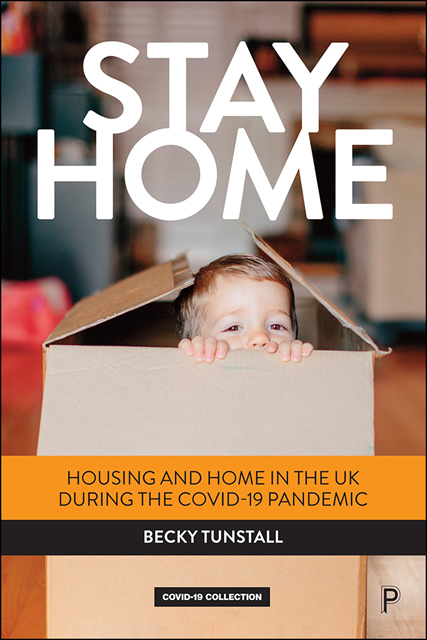Book contents
- Frontmatter
- Contents
- List of figures, tables and photos
- Acknowledgements
- 1 COVID-19, housing and home
- 2 UK households and homes before the pandemic
- 3 The pandemic and pandemic policy in the UK
- 4 People, households and time at home in the pandemic
- 5 The role of household and home in COVID-19 infection and death
- 6 Being vulnerable or ill at home in the pandemic
- 7 The impact of COVID-19 and COVID-19 policy on incomes, housing costs and housing security
- 8 The impact of COVID-19 and COVID-19 policy on the housing market
- 9 Summary and conclusions
- Appendix: The data from people aged 19, 31, 50, 62 and 74
- Notes
- References
- Index
5 - The role of household and home in COVID-19 infection and death
Published online by Cambridge University Press: 20 June 2023
- Frontmatter
- Contents
- List of figures, tables and photos
- Acknowledgements
- 1 COVID-19, housing and home
- 2 UK households and homes before the pandemic
- 3 The pandemic and pandemic policy in the UK
- 4 People, households and time at home in the pandemic
- 5 The role of household and home in COVID-19 infection and death
- 6 Being vulnerable or ill at home in the pandemic
- 7 The impact of COVID-19 and COVID-19 policy on incomes, housing costs and housing security
- 8 The impact of COVID-19 and COVID-19 policy on the housing market
- 9 Summary and conclusions
- Appendix: The data from people aged 19, 31, 50, 62 and 74
- Notes
- References
- Index
Summary
Policies to reduce the impact of household and home on infection
Introduction
The key UK policy to reduce infections told people to stay home, unless they were key workers and could not work from home. Social interaction outside the home and access to private homes by non-residents were controlled by law from March 2020, a move that was totally without precedent in modern times (see Chapters 1 and 3). These restrictions preoccupied policymakers, the media and the public.
However, people were allowed to and required to stay home with their households. In-home and in-household transmission was a major means of infection, but there was little policy or public information on means to prevent infection at home. The policy to provide self-contained emergency accommodation for rough sleepers and night shelter users was a notable exception. Private households, where 98% of UK people lived, remained relatively neglected, even where they contained infected or vulnerable people.
Accommodation for rough sleepers and night shelter users
Policy on risk in the living environment developed differently for homeless people compared to that for the general population. This was due to the pre-existing work on reducing homelessness, an energetic and wellnetworked specialist third sector and community of experts, a pre-existing government ‘tsar’, the relatively small number of people involved and an element of luck.
In early 2020, homelessness charities and doctors in the UK and abroad were concerned that rough sleepers and hostel residents couldn’t isolate, were particularly vulnerable and might infect others. The issue was raised on 11 March 2020 in The Lancet Public Health. On 11 and 12 March, there happened to be a conference on homelessness and health, where UK academics, doctors and homeless non-governmental organisations (NGOs) discussed the risk of outbreaks in hostels and day centres. Following this, two senior doctors with experience of providing healthcare for homeless people, Andrew Hayward and Alistair Story of UCL, brought together a team including the MHCLG, PHE, NHS England and the GLA (Greater London Authority), which was soon ‘working at breakneck speed’, and developed a practical and affordable scheme for using hotels emptied by lockdown restrictions.
- Type
- Chapter
- Information
- Stay HomeHousing and Home in the UK during the COVID-19 Pandemic, pp. 81 - 100Publisher: Bristol University PressPrint publication year: 2022



